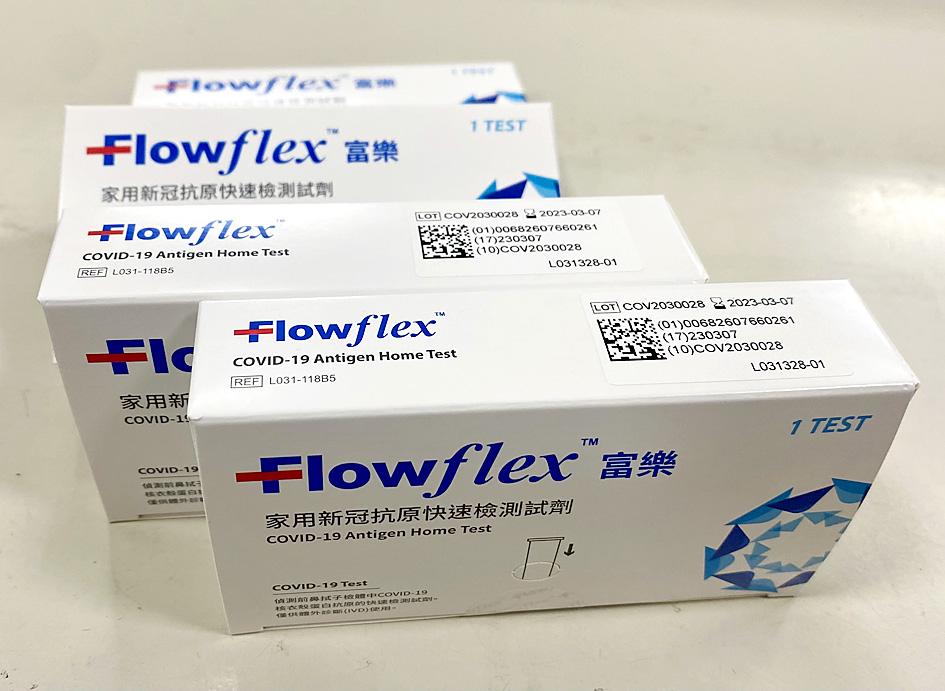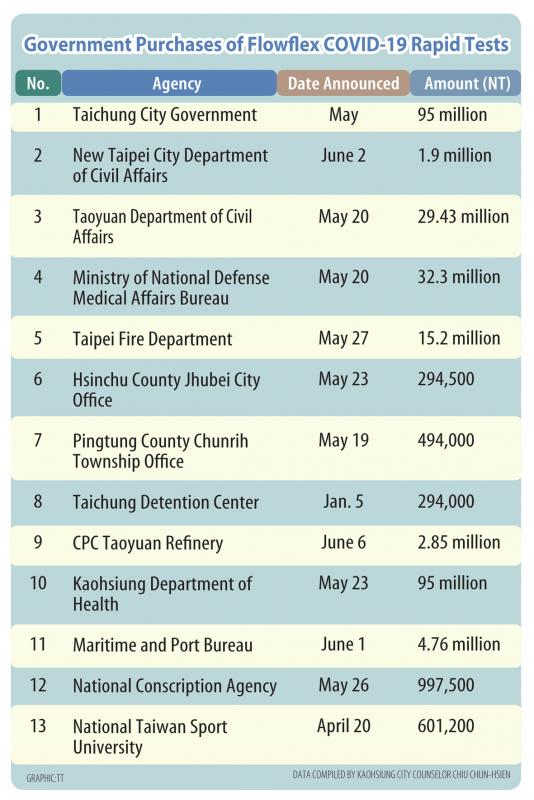The Food and Drug Administration (FDA) yesterday banned the sale and importation of Flowflex COVID-19 rapid test kits, after 2.37 million flawed kits, allegedly made in China, entered the Taiwanese market and were sold to 13 government agencies.
According to regulations, the kits should be manufactured in factories in the US, but the importer allegedly imported poor-quality kits from China illegally and sold them as US-made products, FDA section chief Fu Ying-hsien (傅映先) said.
The FDA ordered that all Flowflex COVID-19 Antigen Home Tests that were imported by Safeway OA Supply Co Ltd (大鑫資訊) be recalled and warned customers against buying or using the product.

Photo: Wei Chin-yun, Taipei Times
The Flowflex test kit obtained emergency use authorization (EUA) on May 10, FDA section chief Fu Ying-hsien (傅映先) said.
The products supplied by the company are suspected to have been manufactured and packaged by YiKang Biological Technology Co Ltd in Hangzhou, China, and shipped to Hong Kong before being sent to Taiwan by air, the Ministry of Justice’s Investigation Bureau said.
Customers reported that the kits failed to reveal lines in either the control line or test line region, it added.

After Safeway OA obtained an EUA for importing Flowflex, it received orders from 13 agencies, including the Ministry of National Defense’s Medical Affairs Bureau, the Zhubei Township Administration Office, the Taichung Department of Health and the Kaohsiung Department of Health, Democratic Progressive Party Legislator Lin Chun-hsien (林俊憲) said.
Deputy Taipei Mayor Huang Shan-shan (黃珊珊) said the city’s fire department purchased 100,000 kits, none of which had been provided to the public, and it had already asked to return the goods and be refunded.
Taichung Health Bureau Director Tseng Tzu-chan (曾梓展) said the bureau would return the 330,000 kits it purchased and look for other sources to fill its needs.
Hsinchu District Prosecutor Weng Kuan-yu (翁貫育) led an investigation into the matter.
Prosecutors on Monday searched five locations, including the company’s offices, a warehouse and private houses, and interrogated five people before requesting to detain Safeway OA chief executive officer Huang Nan-ching (黃南競) and hold him incommunicado.
Company official Chu Shou-hui (朱壽暉) and an assistant surnamed Lee (李) were released on bail of NT$1 million (US$33,661) and NT$100,000 respectively, while the other two were released, prosecutors said.
The FDA said that importers who procure medical products from abroad that do not comply with approved specifications without authorization face up to three years in prison and/or a fine of up to NT$10 million, under Article 62 of the Medical Devices Act (醫療器材管理法).
If the importer uses the name, instructions or labels of another legal medical device, those responsible face up to five years in prison and/or a fine of up to NT$20 million according to Article 61 of the act, the FDA added.
Additional reporting by Tsai Shu-yuan, Ko Yu-hao and CNA

The Chinese military has built landing bridge ships designed to expand its amphibious options for a potential assault on Taiwan, but their combat effectiveness is limited due to their high vulnerability, a defense expert said in an analysis published on Monday. Shen Ming-shih (沈明室), a research fellow at the Institute for National Defense and Security Research, said that the deployment of such vessels as part of the Chinese People’s Liberation Army (PLA) Navy’s East Sea Fleet signals a strong focus on Taiwan. However, the ships are highly vulnerable to precision strikes, which means they could be destroyed before they achieve their intended

The Taiwan Experience Education Program (TEEP) has funded short-term internships in Taiwan for more than 4,500 young people from more than 40 countries since 2015, with the goal of attracting and retaining international talent, the Ministry of Education said yesterday. Fifty-five colleges launched 514 projects this year, including in fields such as semiconductors, artificial intelligence, medicine and biotechnology, green energy, and sustainability, it said. The program provides research and practical internships in Taiwan for two to six months, and offers cultural exchange and networking opportunities, the ministry said. For example, National Formosa University’s Embedded System and Autopilot Laboratory developed two solar-powered drones in

GLOBAL: Although Matsu has limited capacity for large numbers of domestic tourists, it would be a great high-end destination for international travelers, an official said Lienchiang County’s (Matsu) unique landscape and Cold War history give it great potential to be marketed as a destination for international travelers, Tourism Administration Director General Chen Yu-hsiu (陳玉秀) said at the weekend. Tourism officials traveled to the outlying island for the Matsu Biennial, an art festival that started on Friday to celebrate Matsu’s culture, history and landscape. Travelers to Matsu, which lies about 190km northwest of Taipei, must fly or take the state-run New Taima passenger ship. However, flights are often canceled during fog season from April to June. Chen spoke about her vision to promote Matsu as a tourist attraction in

Taipei resident Mu Chu-hua caught some glimpses of China’s mighty military parade on YouTube on Wednesday. As she watched hypersonic missiles roll down Beijing’s Changan Avenue and troops march in lockstep, she did not feel like they posed a threat to Taiwan. Mu, a 69-year-old retiree, said she saw the parade as simply a way for Chinese President Xi Jinping (習近平) to “say thank you to the troops.” “I thought it was quite normal,” she said. “It was very cool.” China’s military parade commemorating the end of World War II was being watched internationally for insights into Beijing’s military advances and its show